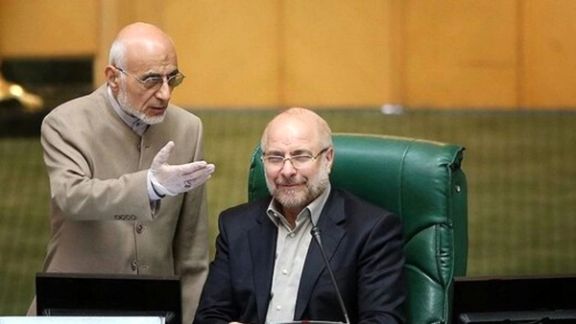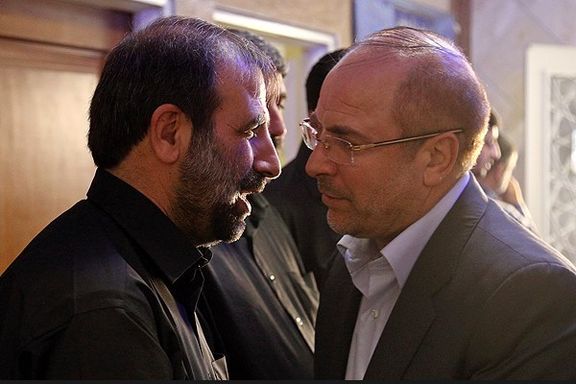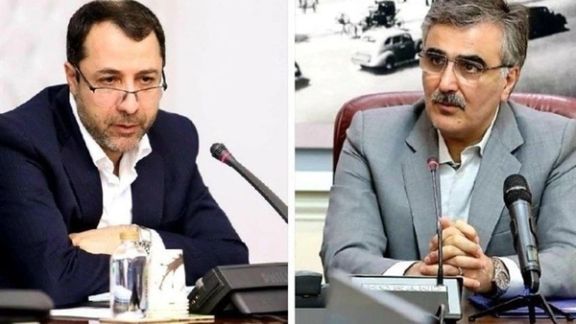Parliament’s Speaker, Allies Removed Iran’s Chief Banker To Fund IRGC

Iran’s parliament speaker helped oust the country’s chief banker in December because he resisted giving more money to the IRGC’s Quds extraterritorial force.

Iran’s parliament speaker helped oust the country’s chief banker in December because he resisted giving more money to the IRGC’s Quds extraterritorial force.
Iran International has obtained information that Speaker Mohammad-Bagher Ghalibaf and his aide Jamaleddin Aberoumand pushed former governor of the Central Bank of Iran (CBI), Ali Salehabadi, out of office to pave the way for stepping up financial support for proxy forces under the command of IRGC’s Quds force (Qods) Force -- a division responsible for extraterritorial military and clandestine operations.
Both Ghalibaf and Aberoumand were senior officers in the Revolutionary Guard. While Ghalibaf was once commander of IRGC’s air force, Aberoumand is an IRGC brigadier general who was a former deputy commander for the outfit’s coordination affairs.

Aberoumand was also the head of IRGC Bonyad Cooperative, an entity also known as the Cooperative Foundation of the Revolutionary Guard and under US Treasury Department sanctions since December 2010. He was apparently in charge of paying the salaries of Quds Force militias.
According to Iran International’s investigative reporter Mojtaba Pourmohsen, the duo coordinated their efforts with at least four other officials. Head of the parliament’s presidium Amir-Ebrahim Rasouli as well as other conservative lawmakers Mohsen Dehnavi, Mostafa Mir-Salim, and Elias Naderan helped Ghalibaf in his plot.
Sources said that Salehabadi was resisting increased payments to Quds forces in the region, but after he was out of the picture, about $400 million was paid to the IRGC’s extraterritorial wing.
The push for more money for the foreign-based military forces was not a selfless act at all, as Iran International sources revealed in February that Ghalibaf and Aberoumand appropriated parts of the salaries that the IRGC meant to pay to its militias in countries such as in Syria and Yemen.

Aberoumand – and probably other IRGC commanders working with him – reported much higher salary expenses to the government and pocketed the difference. The IRGC source told Iran International that they overcharge the government to the tune of $500-1000 per month per fighter. The amount lost in the alleged corruption scheme runs into hundreds of millions of dollars a year.
Calls to remove Salehabadi mounted after the national currency rial hit new lows in December, but after he was removed the fall continued to a historic low of over 600,000 against the US dollar in February. Sending dollars abroad to finance Iran-backed militias reduces the supply of foreign currency in the country, and contributes to the devaluation of the rial against the dollar.
The Islamic Republic pays different amounts to its Quds forces and proxy militias in different countries of the region, with monthly payments in Syria and Iraq being higher than the forces in Yemen and way lower than the forces in Lebanon. According to unconfirmed reports, the Quds force has more than 200,000 forces across the Middle East although the number the IRGC is eager to admit is about half of that.
Zainebiyoun Brigade -- recruited mainly from Shia Pakistanis living in Iran – and Fatemiyoun Brigade – recruited from Afghan refugees in Iran and Afghanistan – were formed in 2014 to fight in Syria along with President Bashar al-Assad forces. These forces, along with Houthis in Yemen and Hezbollah forces in Lebanon are in fact employed and regularly paid by the IRGC.
A senior IRGC commander, who talked to Iran International on condition of anonymity, says the Fatemiyoun, Zainebiyoun and Houthis were paid a monthly salary of $700 in 2018 but the figure has been reduced in recent years. By 2022, the militiamen are paid about $100 to $200 per month. According to this information, Hezbollah fighters receive the highest salaries among the proxy forces, at about $1,300 per month, and the Yemeni Houthis receive $100 a month. Forces within the ranks of Lebanese Hezbollah recently received a $125 bonus for the fasting month of Ramadan.